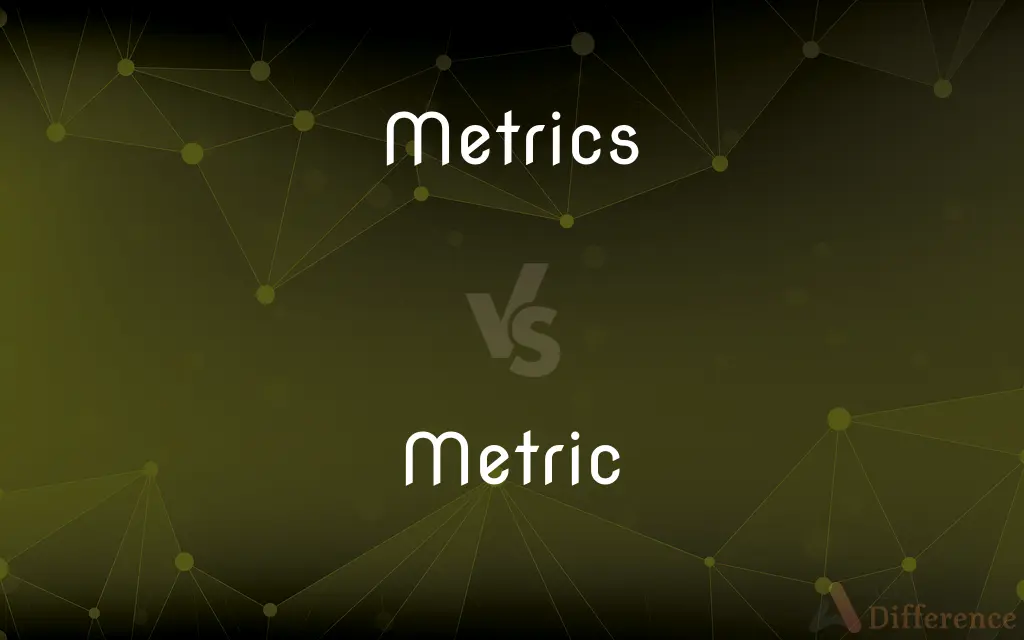Metrics vs. Metric — What's the Difference?
Edited by Tayyaba Rehman — By Urooj Arif — Updated on April 24, 2024
Metrics are quantitative measurements used to assess performance, while a metric refers to a single standard of measurement.

Difference Between Metrics and Metric
Table of Contents
ADVERTISEMENT
Key Differences
Metrics encompass various quantitative measurements used in different contexts to gauge performance, effectiveness, or condition. Whereas a metric is a specific standard or unit used to express a particular dimension or quantity. In business, metrics might include sales volume, customer satisfaction scores, and operational efficiency, while a single metric could be something like dollars, liters, or miles.
Metrics are often used in plural form, suggesting a collection of data points or measurements that are analyzed to make informed decisions. On the other hand, the term metric can be used to refer to one element of this collection, emphasizing its role as a part of a larger analytical framework.
Metrics serve as crucial tools in performance management, helping organizations to set goals, measure outcomes, and guide strategic planning. Conversely, a metric acts as a building block for these tools, fundamental in quantifying the components of broader assessments.
Metrics are typically discussed in contexts where multiple aspects of performance are being evaluated simultaneously, such as in analytics dashboards or performance reports. In contrast, a metric might be highlighted when discussing a specific area of focus, like reducing cycle time in a manufacturing process.
Metrics can be tailored to fit various industries and purposes, offering flexibility in how data is gathered and interpreted. Whereas a metric provides a standardized way to measure and compare results, ensuring consistency across different evaluations.
ADVERTISEMENT
Comparison Chart
Definition
Quantitative measurements used to assess performance.
A standard of measurement.
Usage
Plural, referring to multiple measurements.
Singular, referring to a single standard.
Context
Used to evaluate multiple aspects simultaneously.
Focuses on one specific measurement.
Purpose
To guide decision-making and strategic planning.
To quantify and standardize measurements.
Flexibility
Can be tailored to specific industries and needs.
Provides a consistent measurement basis.
Compare with Definitions
Metrics
Indicators in education to gauge student progress.
Teachers monitored learning metrics to adjust teaching methods.
Metric
A criterion in project management.
Completion rate is a vital project metric.
Metrics
Benchmarks in healthcare to measure patient satisfaction.
Hospital administrators analyzed patient care metrics for quality assurance.
Metric
A measure in economics.
GDP is a crucial economic metric.
Metrics
Quantitative indicators used to assess business performance.
The company reviewed its metrics to improve profitability.
Metric
A standard for quantitative measurement.
Distance was measured in the metric of meters.
Metrics
Standards used in software development for code quality.
The team used code complexity metrics to refine their software.
Metric
A scale in scientific experiments.
The metric for temperature was degrees Celsius.
Metrics
Measurements used in scientific research to evaluate outcomes.
Researchers used several metrics to analyze the experiment's effectiveness.
Metric
A unit used in performance evaluations.
The primary metric for customer service was response time.
Metrics
The use or study of metrical structures in verse; prosody.
Metric
Of or relating to the metric system of measurement.
Metrics
Plural of metric
Metric
(music) Of or relating to the meter of a piece of music.
Metrics
The study of metrical verse.
Metric
Of or relating to distance.
Metrics
The statistical analysis of data sets or big data.
Metric
A measure for something; a means of deriving a quantitative measurement or approximation for otherwise qualitative phenomena (especially used in engineering).
What metric should be used for performance evaluation?
What are the most important metrics to track for your business?
It's the most important single metric that quantifies the predictive performance.
How to measure marketing? Use these key metrics for measuring marketing effectiveness.
There is a lack of standard metrics.
Metrics
The theory of measurement.
Metric
(mathematics) A function for the measurement of the "distance" between two points in some metric space: it is a real-valued function d(x,y) between points x and y satisfying the following properties: (1) "non-negativity": , (2) "identity of indiscernibles": , (3) "symmetry": , and (4) "triangle inequality": .
Metrics
The study of poetic meter and the art of versification
Metric
(mathematics) A metric tensor.
Metric
Abbreviation of metric system
Metric
To measure or analyse statistical data concerning the quality or effectiveness of a process.
We need to metric the status of software documentation.
We need to metric the verification of requirements.
We need to metric the system failures.
The project manager is metricking the closure of the action items.
Customer satisfaction was metricked by the marketing department.
Metric
Relating to measurement; involving, or proceeding by, measurement.
Metric
Of or pertaining to the meter as a standard of measurement; of or pertaining to the decimal system of measurement of which a meter is the unit; as, the metric system; a metric measurement.
Metric
A function of a topological space that gives, for any two points in the space, a value equal to the distance between them
Metric
A decimal unit of measurement of the metric system (based on meters and kilograms and seconds);
Convert all the measurements to metric units
It is easier to work in metric
Metric
A system of related measures that facilitates the quantification of some particular characteristic
Metric
Based on the meter as a standard of measurement;
The metric system
Metrical equivalents
Metric
The rhythmic arrangement of syllables
Common Curiosities
What is the difference between metrics and KPIs?
Metrics are broad measurements of performance, whereas KPIs (Key Performance Indicators) are critical metrics that directly impact success.
What is a metric?
A metric is a single, defined standard of measurement used within various evaluations.
How are metrics used in business?
Businesses use metrics to monitor, analyze, and improve their performance and operational efficiency.
What are metrics?
Metrics are various measurements used to assess and compare performance across different areas.
Why is it important to choose the right metrics?
Choosing the right metrics is crucial because they influence strategic decisions and resource allocation.
Can a metric be non-quantitative?
Generally, a metric refers to quantitative measures, though in some contexts it might include qualitative assessments.
How do metrics aid in decision-making?
Metrics provide a data-driven basis for making informed decisions in business strategies and practices.
How are metrics used in education?
In education, metrics might include student attendance rates, test scores, and graduation rates.
How is a metric determined in a scientific experiment?
In science, a metric is determined based on the specific needs of the research, often relating to precision and relevance.
What are examples of common metrics in healthcare?
Common healthcare metrics include patient recovery rates, treatment effectiveness, and staff response times.
What roles do metrics play in software development?
Metrics in software development often assess code quality, project timeline adherence, and bug resolution effectiveness.
Share Your Discovery

Previous Comparison
Hydrophone vs. Sonar
Next Comparison
Warm vs. WarmthAuthor Spotlight
Written by
Urooj ArifUrooj is a skilled content writer at Ask Difference, known for her exceptional ability to simplify complex topics into engaging and informative content. With a passion for research and a flair for clear, concise writing, she consistently delivers articles that resonate with our diverse audience.
Edited by
Tayyaba RehmanTayyaba Rehman is a distinguished writer, currently serving as a primary contributor to askdifference.com. As a researcher in semantics and etymology, Tayyaba's passion for the complexity of languages and their distinctions has found a perfect home on the platform. Tayyaba delves into the intricacies of language, distinguishing between commonly confused words and phrases, thereby providing clarity for readers worldwide.














































